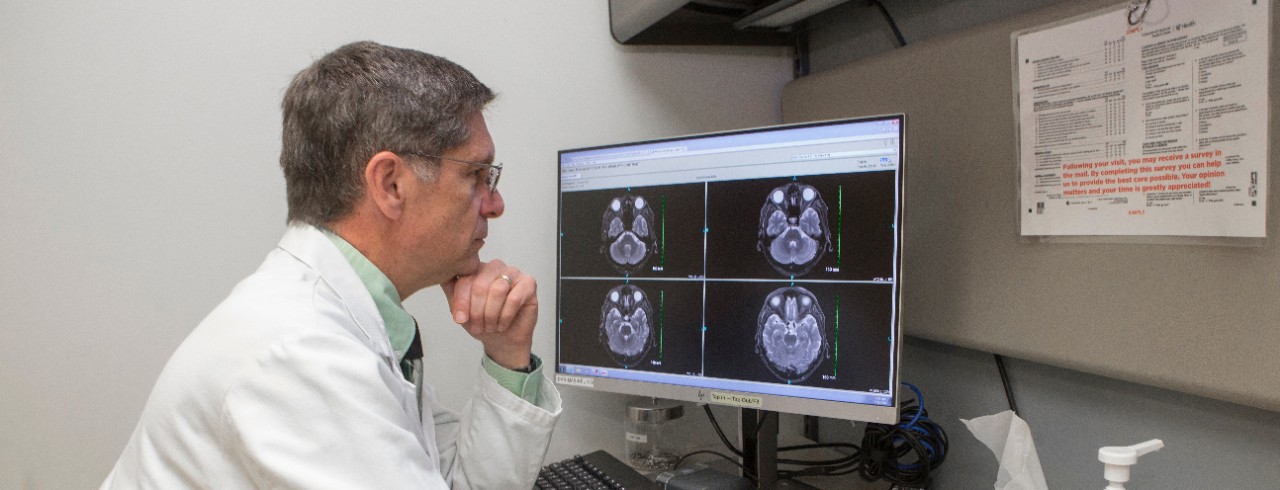
Thrombectomy less beneficial in large-core stroke
UC expert comments on trial results to Medscape
Thrombectomy, a minimally invasive stroke procedure that uses a catheter to remove a blood clot from a blood vessel in the brain to restore blood flow, has been shown to be beneficial in patients with large-core ischemic stroke.
But a secondary analysis of data from the randomized SELECT2 trial recently showed that patients with the greatest volume of tissue injury may benefit less from the procedure.
The analysis used imaging and outcome data from the 322 patients with large-core ischemic stroke included in the trial to look at whether the occurrence of severe hypodensity modified the effect of thrombectomy.
The results showed that as the volume of severe hypodensity increased, the odds of a favorable outcome with thrombectomy decreased.
The University of Cincinnati's Joseph Broderick, MD, commented on the study findings to Medscape.
"These data, if validated, provide a more fine-tuned approach to the use of endovascular therapy in patients with larger volumes of ischemic core," said Broderick, professor in the University of Cincinnati’s Department of Neurology and Rehabilitation Medicine in the College of Medicine and director of the UC Gardner Neuroscience Institute.
Broderick explained that greater intensity of hypodensity has been recognized as a marker for a greater likelihood of unsalvageable brain.
"There are some parallels with diffusion/flair mismatch that have been used to identify patients who may benefit from reperfusion," he said. "The next step will be to test these parameters in other published and reported large-core trials, but time to first image and time to treatment will be important variables to be considered in validating these data and incorporating them into clinical practice."
Featured photo at top of Dr. Broderick. Photo/Joseph Fuqua II/University of Cincinnati
Related Stories
Mural by UC grad honors U.S. military history
July 17, 2024
Local 12 highlighted a new mural by University of Cincinnati graduate and artist Brandon Hawkins that pays tribute to U.S. military history.
Social media fuels extreme political rhetoric
July 17, 2024
UC College of Arts and Sciences Professor Jeffrey Blevins tells Local 12 that online algorithms fuel political polarization on social media.
Camp aims to empower children, teens who stutter
July 17, 2024
A one-week, evidence-based program for children and teens who stutter at the University of Cincinnati will teach kids to communicate effectively, advocate for themselves and develop confidence about their communication abilities. Camp Dream. Speak. Live., which is coming to Cincinnati for the first time July 22-26, began in 2014 at the University of Texas at Austin. The Arthur M. Blank Center for Stuttering Education and Research at UT expects to serve more than 2,000 children at camps across the United States, Africa, Asia and Europe this year.
From intern to full-time: Recent Lighting Design grad joins Bandit Lites
July 16, 2024
Lighting & Sound America spotlights recent graduate Riley Rowan's new position at Bandit Lites, a full-service design, management and producer of live events and entertainment.
CCM alum Donald Lawrence to be inducted into Cincinnati Black Music Walk of Fame
July 16, 2024
UC College-Conservatory of Music alumnus Donald Lawrence is part of the 2024 class of Cincinnati Black Music Walk of Fame inductees. Located at the Banks in downtown Cincinnati, the induction ceremony on July 27 will feature a parade of stars and a free concert by the Zapp Band.
U.S. stroke survival is improving, but race still plays role
July 16, 2024
U.S. News & World Report, HealthDay and Real Health covered new research from the University of Cincinnati that found overall rates of long-term survival following stroke are improving, but Black individuals experience worse long-term outcomes compared to white individuals.
Collaborative pianist and vocal coach Kirill Kuzmin joins CCM’s faculty
July 16, 2024
UC College-Conservatory of Music Interim Dean Jonathan Kregor has announced the addition of Kirill Kuzmin to the college’s faculty of distinguished performing and media arts experts, researchers and educators. A Grammy-nominated collaborative pianist and vocal coach, Kuzmin begins his new role as Associate Professor of Opera/Vocal Coaching on Aug. 15, 2024.
My incredible first year at Cincinnati Law: Journey, reflections and highlights
July 16, 2024
Dean Haider Ala Hamoudi gives a progress report on his first year as dean of the College of Law.
Presidential challenge to UC: Join Ride Cincinnati to fight cancer
July 16, 2024
UC President Neville Pinto has again challenged every UC college and unit to send at least one rider to the September 14 Ride Cincinnati event to help fundraise for cancer research and cancer care. UC students ride free. Signup by July 31 for free UC-branded cycling jersey.
Pediatric ICU rates linked to housing quality, income, education
July 16, 2024
Healio highlighted research led by the University of Cincinnati and Cincinnati Children's Hospital's Carlie Myers that found a link between pediatric ICU admission rates and housing quality, household income and education.
